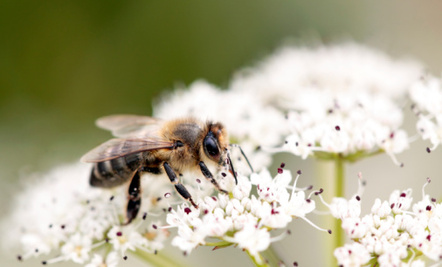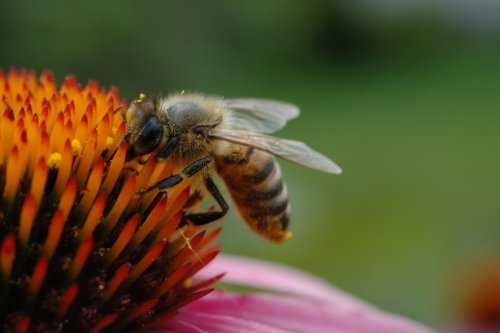In the last decade, there has been an alarming collapse of honeybee populations around the world. Starting in 2006, beekeepers noticed a large percentage (30-90%) of their colonies were leaving the hive with the queen bee and honey still left behind, to be found dead elsewhere. Researchers and beekeepers could not specifically pinpoint the cause of the mass departure and named the problem Colony Collapse Disorder (CCD).
Since then, CCD has become a major crisis. About one-third of the food humans consume–and almost all in the vegan diet!–comes as a result of honeybee pollination. Without them, the food production system as we know it would completely collapse. Researchers have been working hard to find out the cause to CCD and the White House has signed a bill allocating funds to the research.
So far, there are no definitive answers but many potential causes. In most of the hives that have been wiped out, researchers have found a parasite mite called Varroa Destructor. In addition, CCD appears to be linked to the use of pesticides, especially during the winter. While we still can’t specifically pinpoint what is the cause of Colony Collapse Disorder, there are a few little things we can do to help.
1. Try to buy produce with little to no pesticide use
We all try to live a healthy and nourishing lifestyle, and the easiest way to do this and help the bees is to buy produce and grains that were produced with little to no pesticides- some are even labeled “bee friendly.”
2. Buy local honey and support beekeepers
At PD, we’ve previously had this incisive article and discussion on the appropriateness of eating honey as a vegan. Many vegans abstain from honey as it is an animal by-product by definition. On the other hand, other vegans feel that given our complete dependence on countless crops that are pollinated by honeybees, it would not be possible to meaningfully boycott beekeeping–if that were even desirable. (Do we really want to live in a world without peanut butter? Or, more astonishingly, 80% of world’s plants and 90% of food crops? Nope). Many small and independent beekeepers maintain responsible practices. If that’s not enough, it’s been labeled as the most eco-friendly sweetener! If bought locally, it leaves less carbon footprint than any other sweetener and requires minimal processing.
I eat honey–and whenever possible buy local, organic, raw kind. This helps support our local beekeepers, who in turn make the best effort to keep their bees healthy and thriving. Many beekeepers set up stands at local farmers markets and have a wider variety of products to purchase than just honey. It may inspire you to start a backyard hive yourself.
3. Support bee organizations and spread the word
There are plenty of beekeeping organizations out there: American Beekeeping Federation and Honey Love are wonderful, and they need your support. Even if you can’t donate anything, just spreading the word on their cause helps a great deal.
4. Plant flowers to attract honeybees and leave out water
Honeybees love pollen! They are extremely attracted to yellow, violet, orange, and blue flowers, so leaving out pots of flowers for them to feast on or planting flowers in your garden will be a treat. They also love herbs like sage, mint, thyme, lavender, berries, daisies, sunflowers, honeysuckle, etc. Many also don’t realize that bees need water and get hot and thirsty. Leaving out a pan of water for them will rehydrate them and cool them down.
5. Write to your Senators and local law makers
A simple letter or email to your local law makers tells them that you care and want change. The more people do this, the more likely they are to help with bee research and preservation.
Would you try any of these ways to support the bees? Please share!
Also by Katrina: 4 Refreshing Summer Spritzer Recipes
Related: The Great Vegan Honey Debate
Opinion: Why PETA Gives Vegans a Bad Name
Opinion: Should Vegans Support Lab-Grown Meat?
__
Photo: Cyrus via Flickr






